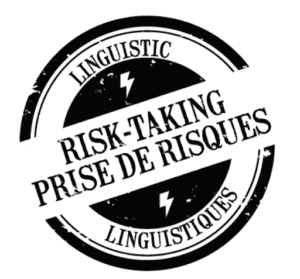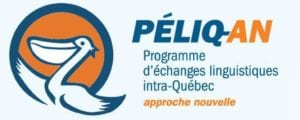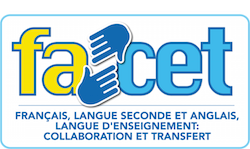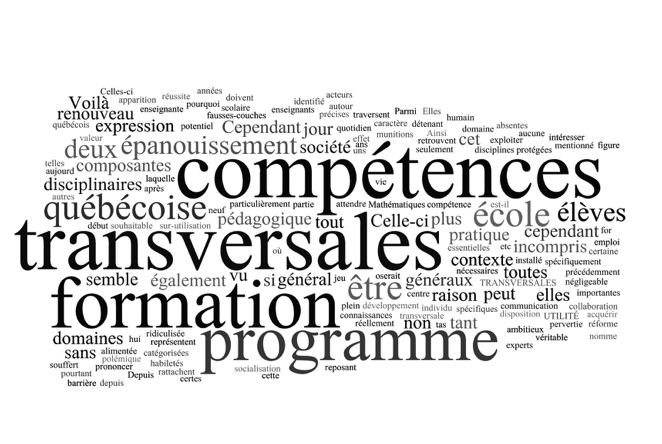This post was co-written by Julie Paré & Emma Legault
Youth attending English-language schools are more linguistically diverse than ever before. With many hailing from families with a French- and English-speaking parent, narratives surrounding what it means to be an English speaker in Quebec are changing.
In 2018, a team of researchers from Université de Montréal received funding from the Direction du soutien au réseau éducatif anglophone (DSREA) to learn more about identity positioning among students enrolled in English school boards for three regions of Quebec: the Gaspé-Îles-de-la-Madeleine, l’Outaouais, and l’Estrie. The study’s focus on the regions was intended to complement other research findings developed in urban areas.
The study, Educational issues and identity positioning among students enrolled in an English school board in Québec: a case study of three regions, highlights the ongoing complexity of English identity in Quebec as well as some of the ways in which relationships with the Francophone majority can tip the scales in favour of bilingualism and belonging.
…the results also show a desire among young people to learn French and to nurture closer relations with the majority group and the Francophonie. These young people value bilingualism as a means of fostering social cohesion in Québec, (Magnan et al., p. 125).
Anglophone Youth: Relationship to FSL & Bilingualism
According to the study, participating Anglophone youth commonly see French as the language of the broader community – the language that needs to be used to access public services and spaces. While this creates some incentive to learn the language as well as a context in which to practice, it often contributes to a sense of language anxiety, linguistic insecurity and/or injustice, especially for those who do not consider themselves to be functionally bilingual.
Anglophone youth from the study largely recognize the need to protect French in Quebec and seldom question language laws; however, they would still like to see the Francophone majority learn to speak English as a means of further bridging linguistic divides within their communities. And they’re not alone; many Francophone youth share this goal, albeit for different reasons.
Some people want to travel, experience things in other parts of the world and English is the key….English is important to learn if you want to have a good job.
– Simon Bérubé, 18 years old (Valiente, 2017)
Are Anglophone Youth too Self-Critical?
Linguistic Capacity vs. Perception
The study highlights that youth today are increasingly bilingual; however, they often lack confidence. Youth also tend to believe, for reasons real or imagined, that proficiency in French means speaking the language as well as a unilingual Francophone.
This insecurity is reflected in the discourse of young people when they compare themselves to native French-speakers. While they freely call themselves bilingual in comparison to other French learners, they do not dare to do so when comparing themselves to unilingual Francophones. Thus, even for students who are not otherwise worried about their French skills…there is a feeling of linguistic insecurity, since they feel they cannot attain the standards and variation expected of a unilingual francophone Quebecer, (p.102).
Promoting French Second Language Acquisition
While English language schools can and do help to lay the foundation for French second language acquisition, the need for authentic and relational contexts for learning, inside and outside the classroom, cannot be overstated.
Here are some winning strategies to help mitigate language anxiety and linguistic insecurity which will support students who are learning French as a second language:
 Strategy 1: Explore the concept of language anxiety together and consider what could be done to help bolster students’ linguistic confidence. Raise awareness and sensitize students to the role language plays in shaping social networks, access to public services and spaces, and our sense of belonging to Quebec society.
Strategy 1: Explore the concept of language anxiety together and consider what could be done to help bolster students’ linguistic confidence. Raise awareness and sensitize students to the role language plays in shaping social networks, access to public services and spaces, and our sense of belonging to Quebec society.
Linguistic Risk-Taking Passport Initiative (in development)
The Linguistic Risk-Taking Passport Initiative will help students discover new and creative ways of using French inside and outside the classroom. It intends to encourage students to take various risks that will boost confidence in their second language. Real-life communication in a second language is not stress-free. It may involve “risk factors” such as making mistakes, being misunderstood, misunderstanding others, taking on a different identity, changing language use habits, and so on. That is why some learners tend to stay within the comfort zone of their preferred official language when going about their daily business and thus miss out on opportunities to “live” bilingually.

Strategy 2: Initiate joint activities between French and English schools to promote more harmonious and collaborative inter-group relationships.
The Programme d’échanges linguistiques intra-Québec – approche nouvelle (PÉLIQ-AN) of the Ministry of Education (MEQ) supports language exchange projects between groups of students from Québec’s English and French schools. It applies to elementary and secondary schools in the private and public sectors

Strategy 3: Encourage parents to enrol their children in sports or leisure activities in French for an “authentic, unilingual and immersive experience.” Strategies like this one also present Anglophone & Francophone youth with the opportunity to build friendships that continue to contribute to language acquisition and social cohesion in Quebec society over time.
Accent Québec is a bilingual online platform providing curated resource collections in French designed to support teachers, students and parents to improve their experience of French as a Second Language (FSL) in and out of school. Accent Québec’s goal is to develop bilingualism by promoting French and Francophone culture to our English-speaking youth. Accent Québec provides access to recreational, cultural and educational resources to enable young Anglophones to experience different activities in French.
 Strategy 4: Promote the value of partial second language skills, expose students to Francophone culture and create opportunities for practice through activity prompts.
Strategy 4: Promote the value of partial second language skills, expose students to Francophone culture and create opportunities for practice through activity prompts.
Adventures and Missions
Challenges for students to practice French second language skills at school and at home!
FLS Adventures Elementary – Cycle 1
FLS Missions Elementary – Cycle 2
FLS Missions Elementary – Cycle 3
FLS Missions High School – Cycle 1
FLS Missions High School – Cycle 2
 Strategy 5: Encourage English Language Arts (ELA) and French Second Language (FSL) teachers to work together to develop learning situations that facilitate learning and the transfer of knowledge across languages.
Strategy 5: Encourage English Language Arts (ELA) and French Second Language (FSL) teachers to work together to develop learning situations that facilitate learning and the transfer of knowledge across languages.
FACET Program (Français, langue seconde et Anglais, langue d’enseignement: Collaboration et Transfert)
Much has been learned about the benefits of English Language Arts (ELA) and French Second Language (FSL) teachers who worked together to develop learning situations that enhance student learning in both language classrooms. The purpose of this new funding program is to provide the conditions that will facilitate a more collaborative approach to language teaching in Quebec’s English schools.
Belonging
Youth today are more connected to the global community than ever before. Perhaps that is why many English speaking youth feel that while they are a minority within Quebec, they are also part of a larger community within Canada and abroad.
At home, Anglophone youth commonly perceive the majority as “francophone, unilingual, nationalist, sovereigntist,” whereas the English community at large is considered more tolerant of diversity and generally more inclusive. Coupled with a sense of linguistic insecurity, their sense of belonging to the province can come into question:
The feeling of not being as proficient in French as native speakers can provoke greater feelings of attachment to identity positions more aligned with the English language, Canada, bilingualism, and even more so to the local area or to a self-identification such as “citizen of the world,” (Magnon et al., p. 125).
Call to Action & Resources
All educators have a role to play in promoting bilingualism and a sense of belonging among Anglophone youth in Quebec. There are (additional) resources available to help:
Throughout the study, Community Learning Centres (CLCs) were recognized as an important mechanism for introducing culturally relevant activities and effective solutions for Anglophone youth at risk of dropping out of school. Adept at creating and nurturing school-community partnerships, CLC leaders could be natural allies for educators seeking to develop project-based learning opportunities across linguistic communities.
The I Belong project, which is expected to run again next school year, is a project-based learning opportunity that invites educators and students to explore their sense of identity and belonging to Quebec society, including their linguistic identity. With access to classroom resources, and funding to partner with a Quebec based artist, it could be a natural starting point for teachers interested in engaging with students in the topic.
The study by Magnan et al. (2018) ultimately affirms the ongoing complexity of language and identity positioning among youth in Quebec, while reminding us that there is perhaps no greater resource to develop in favour of bilingualism than their inherent desire to be in a relationship with one another, both at home and abroad.
Definition of Key Terms
“It is a concept usually understood as negative feelings, anxieties, and stress experienced by speakers in learning and using a second language. The feeling of language anxiety varies greatly from one person to another, as well as from one context to another. For example, the same speaker may feel very anxious in the classroom, but very little in informal interactions with friends in the second language. Anxiety can be particularly exacerbated in a context where the speaker fears being discriminated against or eliciting negative judgments by “native” speakers, particularly in a minority or migratory context,” (as cited in Magnan et al., 2018).
Linguistic insecurity
“It can be defined, according to Vézina (2009), as the feeling of discomfort that results from an awareness by a speaker of the gap between the language form he uses and the expected linguistic norm in relation to this language. The concept of insecurity is different from that of language anxiety since it does not only affect second-language learners. The feeling of linguistic insecurity also concerns speakers of minority or stigmatized languages or dialects. Linguistic insecurity also goes beyond individual experience, since it can be applied more generally to members of linguistic communities who share certain attitudes, beliefs and linguistic representations,” (as cited in Magnan et al., 2018).
Identity Positioning
“Identities can be defined as positions in relation to social representations since people make sense of themselves and their experiences by drawing on and reconstructing social representations,” (as cited in Andreouli, 2010).
References
Andreouli, E. (2010). Identity, Positioning and Self-Other Relations. Papers on Social Representations, 19(13). 1-14. https://www.researchgate.net/publication/228766142_Identity_Positioning_and_Self-Other_Relations.
Magnan, M-O., Levasseur, C., Grenier, V. & Darchinian, F. (2018). Enjeux scolaires et positionnements identitaires chez les élèves fréquentant une école d’une commission scolaire anglophone au Québec : étude de cas de trois régions. Université de Montréal. http://hdl.handle.net/1866/21219.
Magnan, M-O., Levasseur, C., Grenier, V. & Darchinian, F. (2018). Educational issues and identity positioning among students enrolled in an English school board in Québec : a case study of three regions. Université de Montréal. http://hdl.handle.net/1866/21220.
Valiente, G. (2017, September). Controversy in Quebec as more french students choose english colleges. Toronto Star. https://www.thestar.com/news/canada/2017/09/09/controversy-in-quebec-as-more-french-students-choose-english-colleges.html.
Featured Image Photo Credit: Photo du documentaire « Bi* – Bilinguisme, la grande utopie canadienne? »





